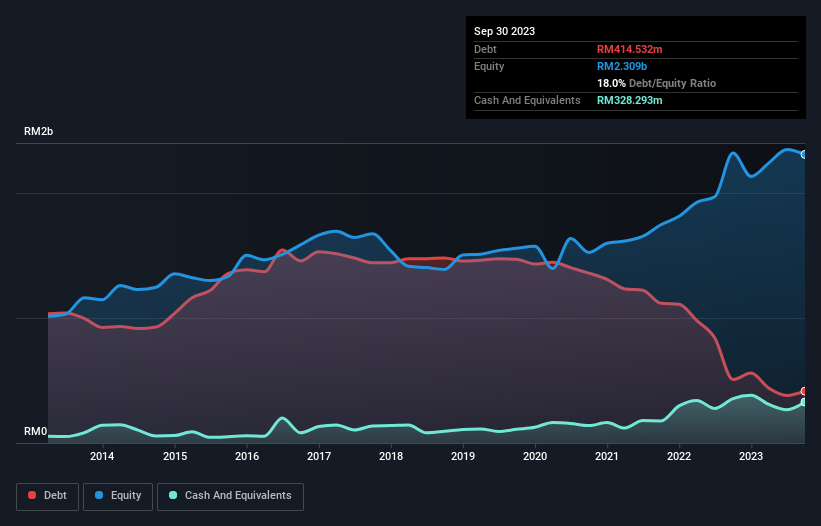Howard Marks put it nicely when he said that, rather than worrying about share price volatility, 'The possibility of permanent loss is the risk I worry about... and every practical investor I know worries about.' When we think about how risky a company is, we always like to look at its use of debt, since debt overload can lead to ruin. We note that TSH Resources Berhad (KLSE:TSH) does have debt on its balance sheet. But should shareholders be worried about its use of debt?
When Is Debt Dangerous?
Debt assists a business until the business has trouble paying it off, either with new capital or with free cash flow. Ultimately, if the company can't fulfill its legal obligations to repay debt, shareholders could walk away with nothing. While that is not too common, we often do see indebted companies permanently diluting shareholders because lenders force them to raise capital at a distressed price. Having said that, the most common situation is where a company manages its debt reasonably well - and to its own advantage. The first thing to do when considering how much debt a business uses is to look at its cash and debt together.
Check out our latest analysis for TSH Resources Berhad
How Much Debt Does TSH Resources Berhad Carry?
You can click the graphic below for the historical numbers, but it shows that TSH Resources Berhad had RM414.5m of debt in September 2023, down from RM507.7m, one year before. However, because it has a cash reserve of RM328.3m, its net debt is less, at about RM86.2m.

How Healthy Is TSH Resources Berhad's Balance Sheet?
According to the last reported balance sheet, TSH Resources Berhad had liabilities of RM432.6m due within 12 months, and liabilities of RM234.5m due beyond 12 months. Offsetting this, it had RM328.3m in cash and RM53.8m in receivables that were due within 12 months. So its liabilities outweigh the sum of its cash and (near-term) receivables by RM284.9m.
Since publicly traded TSH Resources Berhad shares are worth a total of RM1.56b, it seems unlikely that this level of liabilities would be a major threat. However, we do think it is worth keeping an eye on its balance sheet strength, as it may change over time.
We use two main ratios to inform us about debt levels relative to earnings. The first is net debt divided by earnings before interest, tax, depreciation, and amortization (EBITDA), while the second is how many times its earnings before interest and tax (EBIT) covers its interest expense (or its interest cover, for short). Thus we consider debt relative to earnings both with and without depreciation and amortization expenses.
TSH Resources Berhad's net debt is only 0.40 times its EBITDA. And its EBIT covers its interest expense a whopping 11.3 times over. So we're pretty relaxed about its super-conservative use of debt. The modesty of its debt load may become crucial for TSH Resources Berhad if management cannot prevent a repeat of the 38% cut to EBIT over the last year. When it comes to paying off debt, falling earnings are no more useful than sugary sodas are for your health. The balance sheet is clearly the area to focus on when you are analysing debt. But ultimately the future profitability of the business will decide if TSH Resources Berhad can strengthen its balance sheet over time. So if you're focused on the future you can check out this free report showing analyst profit forecasts.
Finally, a business needs free cash flow to pay off debt; accounting profits just don't cut it. So we clearly need to look at whether that EBIT is leading to corresponding free cash flow. Over the last three years, TSH Resources Berhad actually produced more free cash flow than EBIT. There's nothing better than incoming cash when it comes to staying in your lenders' good graces.
Our View
Happily, TSH Resources Berhad's impressive conversion of EBIT to free cash flow implies it has the upper hand on its debt. But we must concede we find its EBIT growth rate has the opposite effect. All these things considered, it appears that TSH Resources Berhad can comfortably handle its current debt levels. Of course, while this leverage can enhance returns on equity, it does bring more risk, so it's worth keeping an eye on this one. When analysing debt levels, the balance sheet is the obvious place to start. However, not all investment risk resides within the balance sheet - far from it. To that end, you should be aware of the 3 warning signs we've spotted with TSH Resources Berhad .
Of course, if you're the type of investor who prefers buying stocks without the burden of debt, then don't hesitate to discover our exclusive list of net cash growth stocks, today.
Valuation is complex, but we're here to simplify it.
Discover if TSH Resources Berhad might be undervalued or overvalued with our detailed analysis, featuring fair value estimates, potential risks, dividends, insider trades, and its financial condition.
Access Free AnalysisHave feedback on this article? Concerned about the content? Get in touch with us directly. Alternatively, email editorial-team (at) simplywallst.com.
This article by Simply Wall St is general in nature. We provide commentary based on historical data and analyst forecasts only using an unbiased methodology and our articles are not intended to be financial advice. It does not constitute a recommendation to buy or sell any stock, and does not take account of your objectives, or your financial situation. We aim to bring you long-term focused analysis driven by fundamental data. Note that our analysis may not factor in the latest price-sensitive company announcements or qualitative material. Simply Wall St has no position in any stocks mentioned.
About KLSE:TSH
TSH Resources Berhad
An investment holding company, primarily engages in oil palm cultivation and processing, and forest plantation activities in Malaysia, Indonesia, Southwest Pacific, the United States, and internationally.
Flawless balance sheet and undervalued.
Market Insights
Community Narratives



